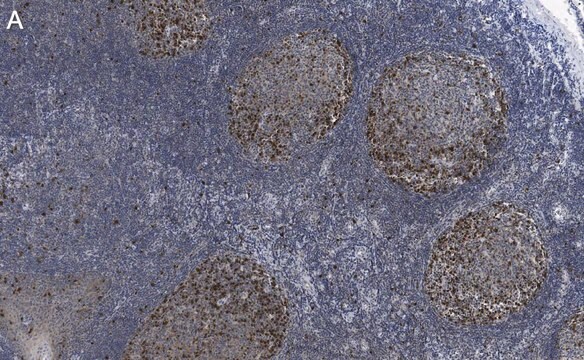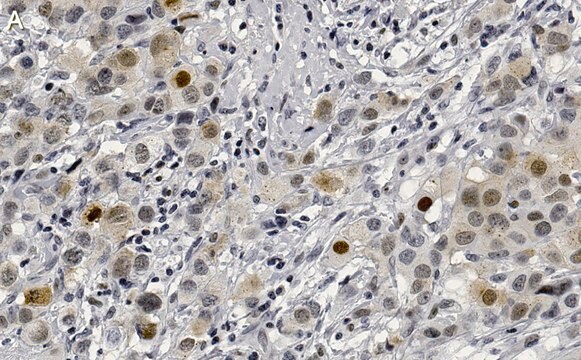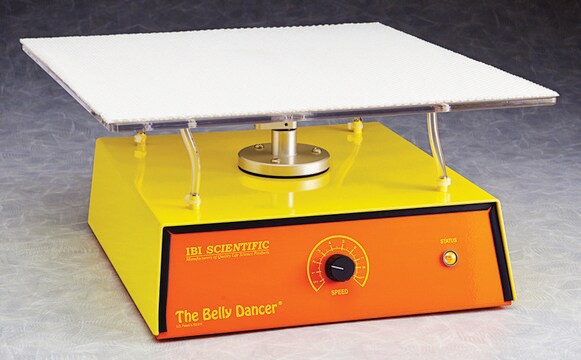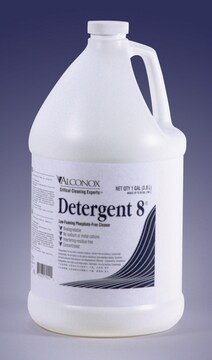General description
We are committed to bringing you greener alternative products, which adhere to one or more of The 12 Principles of Green Chemistry.This antibody is Preservative-free, produced without the harm or sacrifice of animals and exceptionally stable to allow for ambient shipping and storage if needed and thus aligns with "Waste Prevention", "Designing Safer Chemicals" and "Design for Energy Efficiency".
Click here for more information.
ZooMAb® antibodies represent an entirely new generation of recombinant monoclonal antibodies.Each ZooMAb® antibody is manufactured using our proprietary recombinant expression system, purified to homogeneity, and precisely dispensed to produce robust and highly reproducible lot-to-lot consistency. Only top-performing clones are released for use by researchers. Each antibody is validated for high specificity and affinity across multiple applications, including its most commonly used application. ZooMAb® antibodies are reliably available and ready to ship when you need them.
Specificity
Clone 1F21-H1 is a ZooMAb® Rabbit recombinant monoclonal antibody that specifically detects Cyclin B1. It targets an epitope within 22 amino acids from the lysine-rich region within the N-terminal half.
Immunogen
KLH-conjugated linear peptide corresponding to 22 amino acids from the lysine-rich region from the N-terminal half of human Cyclin B1.
Application
Quality Control Testing
Evaluated by Western Blotting in K562 cell lysate.
Western Blotting Analysis: A 1:1,000 dilution of this antibody detected Cyclin B1 in K562 cell lysate.
Tested applications
Western Blotting Analysis: A 1:1,000 dilution from a representative lot detected Cyclin B1 in HeLa and Neuro2a cell lysates.
Immunocytochemistry Analysis: A 1:100 dilution from a representative lot detected Cyclin B1 in HeLa, A431 and HepG2 cells.
Affinity Binding Assay: A representative lot of this antibody bound Cyclin B1 with a KD of 1 x 10-12 in an affinity binding assay.
Immunohistochemistry (Paraffin) Analysis: A 1:100 dilution from a representative lot detected Cyclin B1 in human tonsil tissue sections.
Note: Actual optimal working dilutions must be determined by end user as specimens, and experimental conditions may vary with the end user
Anti-Cyclin B1, clone 1F21-H1 ZooMAb®, Cat. No. ZRB1499, is a recombinant Rabbit monoclonal antibody that detects Cyclin B1 and is tested for use in Affinity Binding Assay, Immunocytochemistry, Immunohistochemistry (Paraffin), and Western Blotting.
Target description
G2/mitotic-specific cyclin-B1 (UniProt: P14635; also known as Cyclin B1) is encoded by the CCNB1 (also known as CCNB) gene (Gene ID: 891) in human. Cyclins are the regulatory subunits of the cell cycle-dependent kinases (CDKs) that are responsible for the phosphorylation of several cellular targets. Cyclins contain the nuclear localization sequence (NLS) that help move CDKs into the nucleus. They also contain PEST (Pro, Glu, Ser, and Thr) sequences that target them for degradation by the ubiquitin-proteasomal pathway. Once the CDKSs have completed their role, they undergo a rapid programmed proteolysis via ubiquitin-mediated delivery to the proteasome complex. Cyclin B1, a regulatory protein involved in mitosis, complexes with CDK1 to form the maturation-promoting factor (MPF). It is shown to be essential for the control of the cell cycle at the G2/M (mitosis) transition. It accumulates steadily during G2 phase and is abruptly destroyed at mitosis. Hence, the cyclin B1-CDK1 complex is considered to be a key regulator for mitotic entry. This complex phosphorylates a number of proteins prior to mitotic entry. Although five serine phosphorylation sites are described for cyclin B1, (Ser 116, 126, 128, 133, and 147), serine 133 phosphorylation by PLK1 regulates the entry of Cyclin B1-CDK1 complex into the nucleus during prophase. At the end of mitosis, cyclin B1 is rapidly removed by a ubiquitin ligase (anaphase-promoting complex/cyclosome) loaded with the targeting subunit CDC20. Activated cyclin B1-CDK1 complex is reported to catalyze its own destruction by stimulating the activity of APC. This ZooMAb® recombinant monoclonal antibody, generated by our propriety technology, offers significantly enhanced specificity, affinity, reproducibility, and stability over conventional monoclonals. (Ref.: Van Zon, W., et al. (2010). J. Cell. Biol. 190(4); 587-602; Yuan, J., et al. (2004). Oncogene 23(34); 5843-5852).
Physical form
Purified recombinant rabbit monoclonal antibody IgG, lyophilized in PBS with 5% Trehalose, normal appearance a coarse or translucent resin. The PBS/trehalose components in the ZooMAb® formulation can have the appearance of a semi-solid (bead like gel) after lyophilization. This is a normal phenomenon. Please follow the recommended reconstitution procedure in the data sheet to dissolve the semi-solid, bead-like, gel-appearing material. The resulting antibody solution is completely stable and functional as proven by full functional testing. Contains no biocide or preservatives, such as azide, or any animal by-products. Larger pack sizes provided as multiples of 25 μL.
Reconstitution
300 μg/mL after reconstitution at 25 μL per vial. Please refer to guidance on suggested starting dilutions and/or titers per application and sample type.
Storage and Stability
Recommend storage of lyophilized product at 2-8°C; Before reconstitution, micro-centrifuge vials briefly to spin down material to bottom of the vial; Reconstitute each vial by adding 25 μL of filtered lab grade water or PBS; Reconstituted antibodies can be stored at 2-8°C, or -20°C for long term storage. Avoid repeated freeze-thaws.
Legal Information
ZooMAb is a registered trademark of Merck KGaA, Darmstadt, Germany
Disclaimer
Unless otherwise stated in our catalog or other company documentation accompanying the product(s), our products are intended for research use only and are not to be used for any other purpose, which includes but is not limited to, unauthorized commercial uses, in vitro diagnostic uses, ex vivo or in vivo therapeutic uses or any type of consumption or application to humans or animals.








